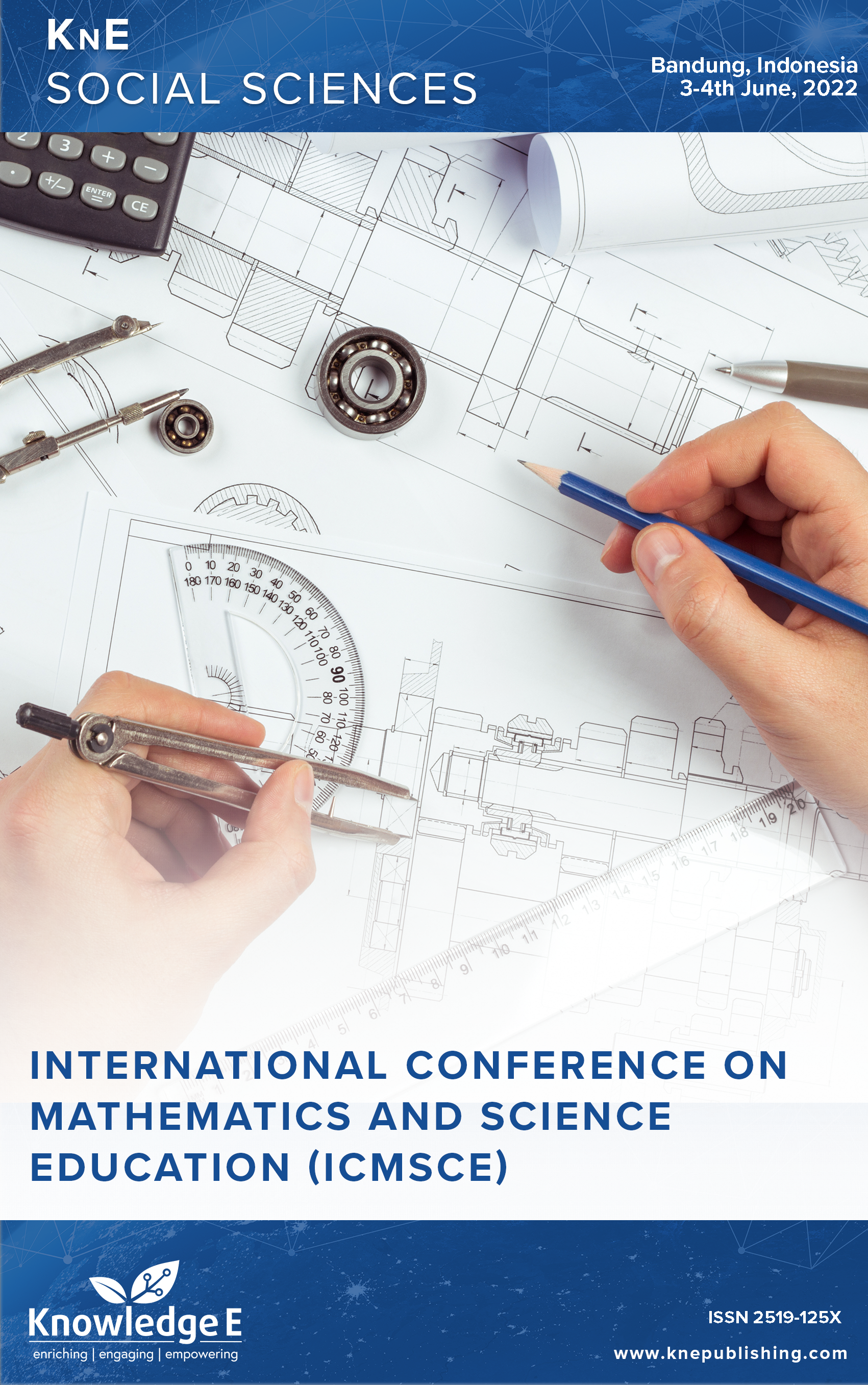Online Quantitative Literacy-Based Biology Learning towards Students' Self-Efficacy
DOI:
https://doi.org/10.18502/kss.v9i13.15910Abstract
Quantitative literacy is an important skill for biology students. During COVID-19, students had to adapt to several changes, including shifting from offline to online classes. However, not all biology content can be taught easily, especially online. Therefore, students need self-efficacy abilities. Self-efficacy was important for students to be able to make a plan for their learning. This research aimed to describe students’ self-efficacy to continue their online biology learning during COVID-19, based on their quantitative literacy skills. This study used 20-item questionnaires with four choices of statements. The biology topic chosen was plant anatomy. This research measured the score of 82 first-year college students’ self-efficacy from three aspects - magnitude, strength, and generality. Data were analyzed using descriptive statistics to measure the mean, the highest, and the lowest students’ self-efficacy scores. The result showed that the average score of students’ self-efficacy was 2.72, which means students’ self-efficacy was in the moderate category. All three aspects were also in the moderate category, with the strength aspect score being the highest at 2.76 and the magnitude aspect score being the lowest at 2.66. Based on the number of participants’ level of self-efficacy, 3% of students were in the high category, 96% were in the moderate category, and 1% were in the low category. The result showed that most of the students in this research have a moderate level of self-efficacy in online biology learning, based on quantitative literacy. This means that most of the students still must develop their self-efficacy skills to learn online quantitative lessons in biology successfully. The results also suggested that it is essential to teach students how to manage their learning behavior through the development of self-efficacy to succeed in online quantitative lessons in biology learning in the future.
Keywords: literacy, online class, self-efficacy
References
Speth EB, Momsen JL, Moyerbrailean GA, et al. Infusing quantitative literacy into introductory biology. Volume 9. 2010. pp. 323–32. DOI: https://doi.org/10.1187/cbe.10-03-0033
Botts RT, Carter L, Crockett C. Using the blended learning approach in a quantitative literacy course. PRIMUS (Terre Ht Ind). 2018;28(3):236–65. DOI: https://doi.org/10.1080/10511970.2017.1371264
Stephen JS, Rockinson-Szapkiw AJ. A high-impact practice for online students: the use of a first-semester seminar course to promote self-regulation, selfdirection, online learning self-efficacy. Smart Learning Environments. 2021;8(1). https://doi.org/10.1186/s40561-021-00151-0. DOI: https://doi.org/10.1186/s40561-021-00151-0
Nuraeni E, Rahman T, Alifiani DP, Khoerunnisa RS. A study of cognitive load for enhancing student’s quantitative literacy in inquiry lab learning. Journal of Physics: Conference Series. 2017;895(1). https://doi.org/10.1088/1742-6596/895/1/012119. DOI: https://doi.org/10.1088/1742-6596/895/1/012119
Rahmoeller M, Steinweg JM. Implementation of a new quantitative Biology course: assessment of students’ abilities and confidence. PRIMUS (Terre Ht Ind). 2022;32(3):346–66. DOI: https://doi.org/10.1080/10511970.2020.1780533
Frith V, Gunston G. Year Medical Curriculum. 2011;3(1):19–23.
Diaz Eaton C, Highlander HC, Dahlquist KD, Ledder G, LaMar MD, Schugart RC. A ‘rule-of-five’ framework for models and modeling to unify mathematicians and biologists and improve student learning. PRIMUS (Terre Ht Ind). 2019;29(8):799– 829. DOI: https://doi.org/10.1080/10511970.2018.1489318
Nuraeni E, Redjeki S, Riandi R, Rahmat A. Perkembangan literasi kuantitatif tumbuhan berbasis dimensi belajar. Jurnal Ilmu Pendidikan. 2015;21(2):127–35.
Liu D, Hughes H, Chase C. Math and data exploration. CBE Life Sci Educ. 2010;9(3):150–3. DOI: https://doi.org/10.1187/cbe.10-05-0073
Horne JH, Woolley HW, Roy A, Schluchter WM, Howard JJ. Teaching basic calculations in an introductory Biology lab. Journal of Microbiology & Biology Education. 2022;23(1). https://doi.org/10.1128/jmbe.00199-21. DOI: https://doi.org/10.1128/jmbe.00199-21
Nuraeni E, Rahmat A. Connecting qualitative observation and quantitative measurement for enhancing quantitative literacy in plant anatomy course. Journal of Physics: Conference Series. 2018;1013(1). https://doi.org/10.1088/1742-6596/1013/1/012009. DOI: https://doi.org/10.1088/1742-6596/1013/1/012009
Ardiansyah R, Survani R, Nuraeni E, Supriatno B, Rahmat A. Bahan ajar anatomi tumbuhan untuk menunjang literasi kuantitatif mahasiswa Biologi. Prosiding Mathematics and sciences forum 2014. pp. 411–416.
Battistelli JM, Franklin RB. Online strategies to improve quantitative skills in microbiology laboratory classes. J Microbiol Biol Educ. 2022 Mar;23(1):1–3. DOI: https://doi.org/10.1128/jmbe.00333-21
Rowe RJ, Koban L, Davidoff AJ, Thompson KH. Efficacy of online laboratory science courses. J Form Des Learn. 2018;2(1):56–67. DOI: https://doi.org/10.1007/s41686-017-0014-0
Dwivedi A, Dwivedi P, Bobek S, Sternad Zabukovšek S. Factors affecting students’ engagement with online content in blended learning. Kybernetes. 2019;48(7):1500– 15. DOI: https://doi.org/10.1108/K-10-2018-0559
Bandura A. Self efficacy; The exercise of control. 1997.
Shirzad S, Barjesteh H, Dehqan M, Zare M. Epistemic beliefs and learners’ selfefficacy as predictors of language learning strategies: toward testing a model. Front Psychol. 2022 Apr;13(April):867560. DOI: https://doi.org/10.3389/fpsyg.2022.867560
Toharudin U, Rahmat A, Kurniawan IS. The important of self-efficacy and selfregulation in learning: How should a student be? Journal of Physics: Conference Series. 2019;1157(2). https://doi.org/10.1088/1742-6596/1157/2/022074. DOI: https://doi.org/10.1088/1742-6596/1157/2/022074
Yokoyama S. Academic self-efficacy and academic performance in Online Learning: A mini review. Front Psychol. 2019 Jan;9( JAN):2794. DOI: https://doi.org/10.3389/fpsyg.2018.02794
Honicke T, Broadbent J. The influence of academic self-efficacy on academic performance: A systematic review. Educ Res Rev. 2016;17:63–84. DOI: https://doi.org/10.1016/j.edurev.2015.11.002
Limiansi K, Hadi S. Students self-efficacy profile in online learning: basic information to improve the quality of learning. Advances in Social Science, Education and Humanities Research. 2022;640:85–90. https://doi.org/10.2991/assehr.k.220129.016. DOI: https://doi.org/10.2991/assehr.k.220129.016
Negara HRP, Nurlaelah E, Wahyudin, Herman T, Tamur M. Mathematics self efficacy and mathematics performance in online learning. Journal of Physics: Conference Series. 2021;1882(1). DOI: https://doi.org/10.1088/1742-6596/1882/1/012050
Fitriani A, Zubaidah S, Susilo H, Al Muhdhar MH. “Students self-efficacy on Biology lessons of senior high schools in Bengkulu city, Indonesia.,” vol. 218, no. ICoMSE. 2018;2017:225–30. DOI: https://doi.org/10.2991/icomse-17.2018.40
Alqurashi E. Self-efficacy in online learning environments: a literature review [CIER]. Contemp Issues Educ Res. 2016;9(1):45–52. DOI: https://doi.org/10.19030/cier.v9i1.9549

